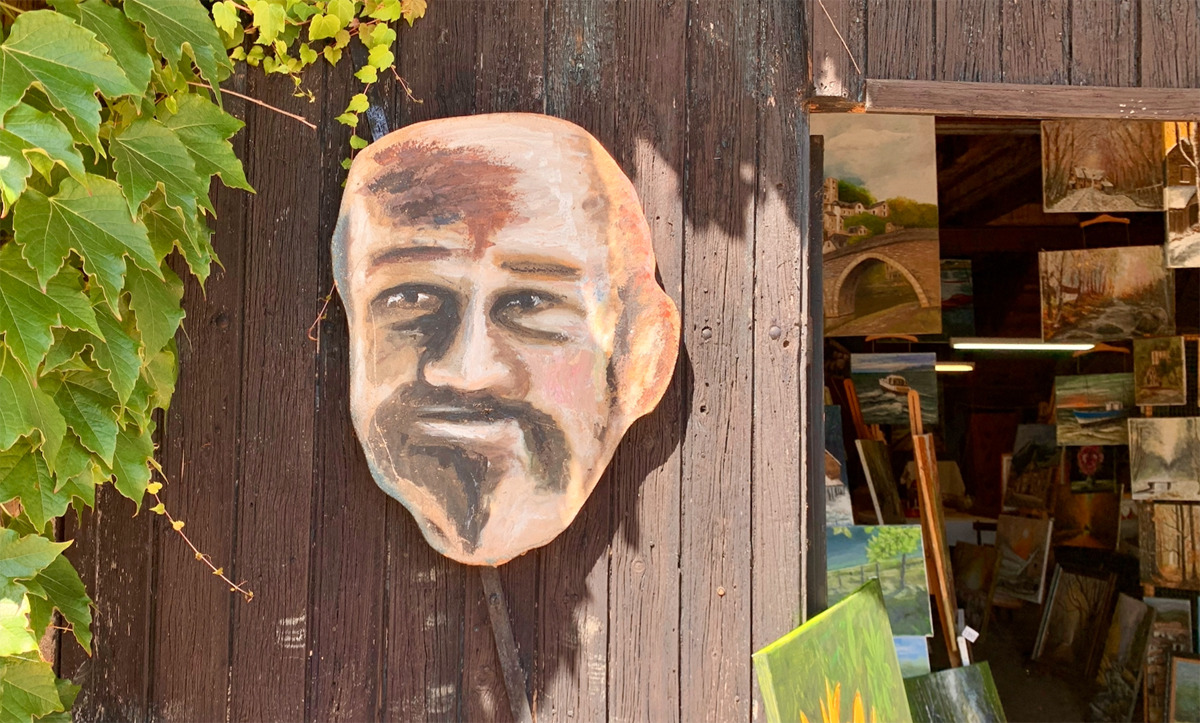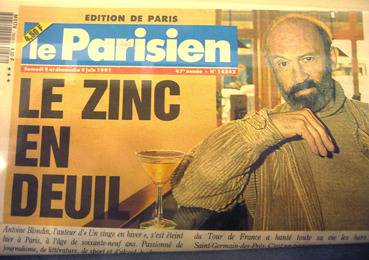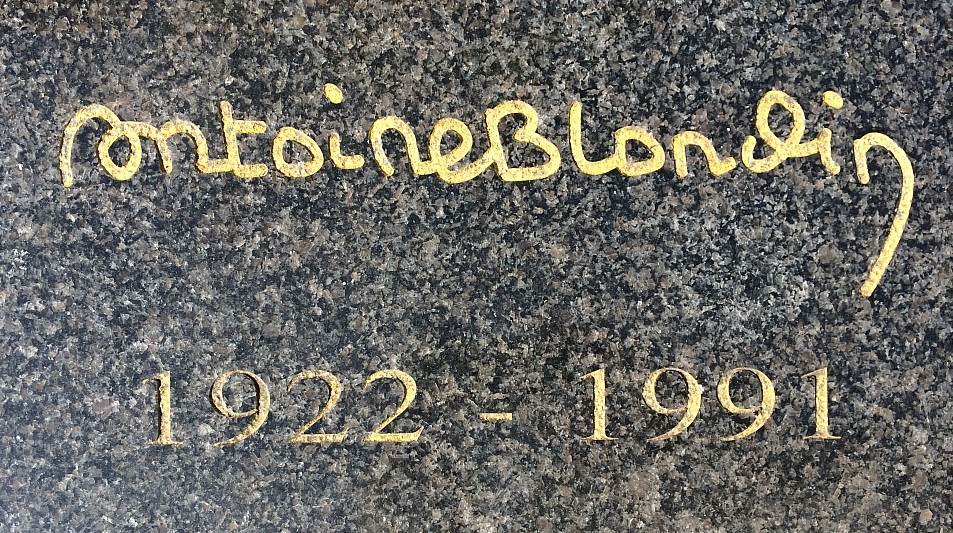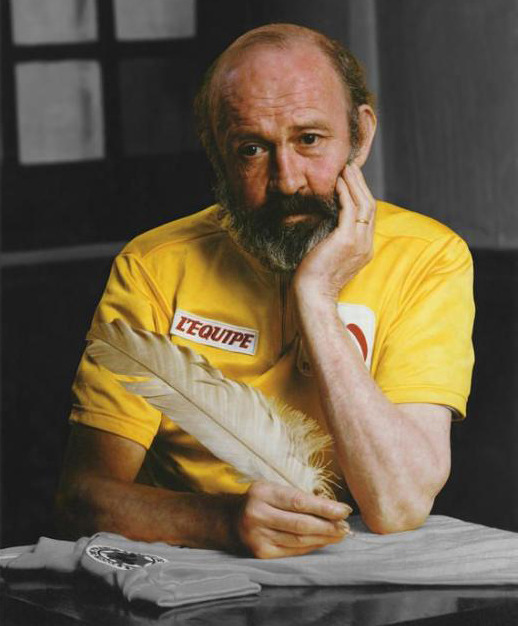Playwright, novelist, political commentator, drunkard and every July, a sports columnist. Antoine Blondin made L’Equipe required reading during cycling’s golden age.
Blondin wasn’t a sports journalist. Born in the 17th arrondissement of Paris in 1922 he was the son of a poet and a proof reader. His early life stayed in literary circles, a degree from the Sorbonne university in Paris and some novels, one of which Un singe en hiver was turned into a film featuring a young Jean-Paul Belmondo. There was also a political side, he spent several years writing for reactionary right wing newspapers and monarchist causes in France (but later seemed to drift to the left, supporting François Mitterand as President). As a young novelist he was of the Hussards movement, a collection of writers who seemed to be in opposition to new writers like Jean-Paul Sartre, and partly defined by this antagonism.
All politics was on hold when it came to his column in sports newspaper L’Equipe, he’d join the paper for July, and at times dabble with the Olympics too. You can try to find his politics in the columns but if you didn’t know you might not be able to tell. After all he was writing for L’Equipe whose agenda is sports coverage. While some novelists have dipped their toe in a bike race or two – think Dino Buzzati – Blondin was a fixture of the Tour de France between 1954 and 1982 and so covered cycling’s supposed “golden age”. This was a time when television coverage began, consumer brands came to the sport and the general backdrop of Western Europe’s economy on the up, the “trentes glorieuses“. Cycling has long been portrayed as a tough, gritty sport but Blondin’s columns meant L’Equipe could be read in Parisian literary salons.
Blondin’s work can be impossible if not awkward to translate because it involves wordplay and frequent puns. When Tom Simpson took the yellow jersey in 1962, Blondin’s column from that day quips “Roule, Britannia” and peppers the piece with “Simpson Orient Express”, he’s a tea-drinking “maillot John” while rival Jacques Anquetil’s team are riding under the “Union Jacques”.
To read and re-read Blondin during the Tour is to be reminded that there’s nothing new under the sun. A day when nobody attacked? One column from 1972 evokes the speaker on the start line saying “get ready ladies and gentlemen, the show is about to begin” only as the flag drops “the start of the stage sunk into a dreary lethargy” writes Blondin, with baleful words about riders “sleep-pedalling” and ends with the remark that several riders were called to the contrôle médicale at the finish, “no doubt to test them for sleeping pills.”
The peril of Blondin is there’s a waiting quip on any race-related matter given he’d covered the Tour for over a quarter of a century. He’s Oscar Wilde for cycling where it’s easier to quote him than to write something original. In a column from 2018 in the newspaper Libération journalist Pierre Carrey got fed up with Blondin and nostalgia, “myths and naphathalene” he blasted, a “pathological attachment to the past”.

Which brings us back the golden age, it probably was a more tender time. Jean-Louis Le Touzet penned a column from 1995 to 2013 for Libération (compiled in a good book) which was almost as free-ranging as Blondin but he got to cover cycling’s leaden years with the Festina scandal, Lance Armstrong and all the rest. It wasn’t as playful, it couldn’t be. Blondin too probably had his own golden age, his pieces from the 1960s help illustrate the times but by the 1980s it’s as if he’s still using a fountain pen and hasn’t spotted the changes around him, whether in the peloton or society at large.

For all the praise heaped on Blondin every July, was it really down to him, or the mission he was given? Hired by L’Equipe, which also organised the Tour de France, he’d travel in the newspaper’s dedicated car which at the time had the right to drive with the peloton so he could see the race up close.
While colleagues Pierre Chany and Jacques Augendre were tasked with writing up the procedural account of the day’s sport for L’Equipe, Blondin just had to pen a column that touched on the race, he could go off on a tangent or even pen a poem to print. Being both up close to events while allowed to stand back gave him a freedom to write what he wanted and this makes his accounts enjoyable today, it’s never about who attacked at which kilometre, plenty many of his pieces neglect to mention the winner of the day.
At times Blondin is indulgent with the riders and not a journalist reporting facts. He’s often on the side of a lesser rider and telling the tale of the loser rather than putting riders like Anquetil or Merckx on a pedestal; when he does it’s to mock them gently. He teased Roger Walkowiak for taking the yellow jersey at the start of the 1956 Tour de France, describing him as a “poujadiste égaré dans le Bottin mondain” which doesn’t translate easily but think of a “petit-bourgeois lost among aristocrats”, an exaggerated way to point out a modest rider among champions. But by the end of the race, Blondin was a supporter of Walkowiak and even said the win provided a level of moral satisfaction. Similarly Blondin became a big fan of Raymond Poulidor, France’s iconic loser to the point that he left Paris and moved to central France to live in a village called Linards, just up the road from Poulidor.
Blondin would frequently get drunk. So much he once accidentally reached for the bottle of ink he’d write with and drank it. After spitting it out all over his hotel room he boasted “now I’ll piss my copy”. In the 1980s he stopped writing for L’Equipe but kept on drinking; he did a TV interview in 1989 in a bar with Serge Gainsbourg, both visibly drunk, audibly slurring their words.

On his death in 1991 Le Parisien’s headline was the “bar was mourning” and France-Soir ran with the headline “Même l’église était bourrée“, a wordplay that literally means “even the church was packed” but also “even the congregation was drunk”, a fitting tribute. He’s buried in the Père Lachaise cemetery in Paris, resting place for Frédéric Chopin, Jim Morrison and Laurent Fignon. Today Linards has a square in his honour and there’s also a one in Paris named after him.

If you want further reading in French, the hefty tome Tours de France publishes all his columns in 944 pages. The “Singe en Hiver” film is on the internet if you want to view it, it’s a mini-classic of its time but one for French cinephiles who’ve exhausted Godard and Clouzot.
If cycling had a golden age – you can make a good case it’s having another now – then Antoine Blondin was part of it. Anquetil, Poulidor, Merckx and others made the headlines and got the results but Blondin added colour and reading his column in L’Equipe every July must have been as much part of the experience of the Tour de France as watching Merckx win again and his free rein to write about anything that caught his eye. Whimsical at the time, nostalgic today but also interesting source material from the era.


I have never left a comment on this Website, but reading your carefully worded thoughts about Antoine Blondin, I couldn’t help but think that, if this truly is a golden age of cycling, then it is being peppered with today’s Blondin in Inner Ring’s words. The thoughtfulness, the ability to convey meaning from cycling into society and vice-versa, the lightness of humour and self-effacing content – all that makes it possible for us, avid cycling readers, to gorge on our sport and so much more, whether it be learning about food and drink as we follow the Tour around France, discovering new roads to ride, books to read or connections to establish between cycling and life writ large.
It takes a special skill to be able to blend all that and never leave the impression of a bored intellectual or a cycling fan trying to come across as interesting – on the contrary, the impression is of a supremely interesting and interested soul that, luckily for us, loves cycling and shares their passion with us through a myriad of points of view, from scouring teams’ accounting reports to stage previews to book recommendations (and who can forget the ability to read French, Italian, Dutch, Spanish).
Your tribute to Blondin is wonderfully crafted, but ultimately leaves me with the thought that we are blessed with the golden age of cycling writing.
Have to say, as far as compliments to our host go, it can never be better worded. Neither is any of this exaggeration. Well done sir or Madame.
Thanks for saying thanks. If I go for a ride tomorrow I’m not sure my helmet will fit any more, it might feel too small.
But there are so many ways to consume cycling now, it’s very much still the TV age and the best time for writing must have been long ago.
Nah, you’re going platinum!
As someone who grew up in the sixties in England , where cycling coverage was limited to the odd line in my Dad’s paper and once a week Cycling mag , it is indeed a wondrous thing to be able to watch it all on television . For me however , a finally crafted piece of writing like the above is always a source of pleasure. I enjoy rereading and savouring particularly well crafted phrases because I know that writing well is an art form in itself and far from common.
should be “finely”
In addition, although most evidence suggests our host is French, his command of idiomatic English is extraordinary, and always a pleasure to read.
My theory is that our splendid host is originally from the UK, but has lived and worked in France for decades. Not that it matters. I love his puns, linguistic treats, and incisive analysis regardless of nationality or origin.
++++1
Such a wonderful comment, a perfect addition to this incredible blog.
Superb and thanks for such wonderful insights
The best comment I’ve ever seen on this blog, and worthy of a chapeau itself. In my much less articulate way, 100% agree.
Splendid piece. Erudite and informative as ever.
Small typo: …While some novelists have dipped their two… (toe).
Nice piece!! I thought of Gianni Brera before Dino Buzzati but so what? IMHO part of a golden age is the quality of writing that is produced. Who is producing writing like this today…in any language? In 4+ decades will those of us still around call this period another golden age? I won’t be here but I tend to doubt it, there’s too much science and not enough passion. No modern rider will ever be as colorful as Jacques Anquetil for example. Vive LeTour!
Thank you so much for this post and for the meticulously detailed wealth of riches in all of the links. Chapeau!
You continue to amaze.
Many more thanks from another long time reader for being a wonderfully erudite, cool-headed, modest and wise companion to my morning coffee again.
It is also possible to listen to Blondin with the podcast of Ecrire Le Sport
https://anchor.fm/s/1d760b48/podcast/rss
First…I can’t imagine even wanting to interview Serge Gainsbourg sans libations.
Second, like how reading commentary on philosophy deepens are thought and understanding of a work, so too does commentary…and the more deeply seasoned with wit and culture, the better. As with Msr. Vasco, reading this blog on a daily basis during classics and GT’s certainly provides that, and then some.